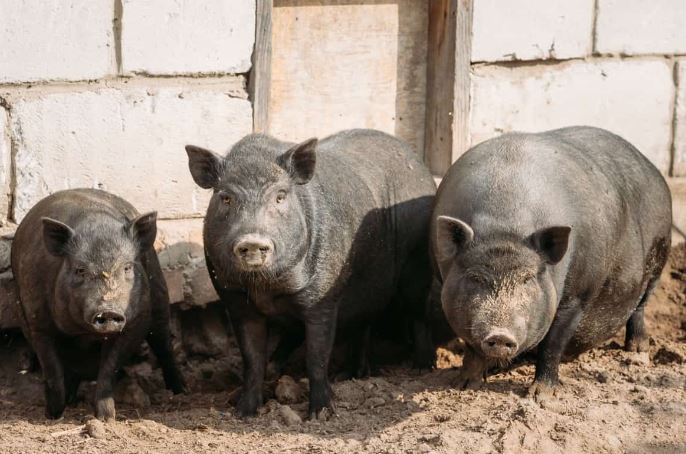Guinea Hog Facts: In this blog post, we will explore the captivating world of Guinea Hogs, shedding light on their origins, size, physical traits, as well as the advantages and disadvantages of owning them. Guinea Hogs are a heritage breed with a unique history and cultural significance, making them a fascinating subject to delve into. We’ll share intriguing details about their origin and regional variations, discuss their average size, and examine their distinct physical features. Additionally, we’ll explore the benefits and considerations of raising these remarkable animals.
Origin and Heritage of Guinea Hogs:
Guinea Hogs, officially known as American Guinea Hogs, are a small black pig breed native to the United States. While their precise origins are unclear, there are theories suggesting a possible connection to the Essex pigs from eastern England. It’s important to note that Guinea Hogs should not be confused with an older breed called the Guinea Hog or Red Guinea.
Read More: Subsistence Agriculture: A Comprehensive Guide to Subsistence Farming
Guinea Hog Size: Average Weight and Height:
Guinea Hogs are classified as a small-sized breed. Adult males, or boars, typically weigh between 69 and 135 kilograms (150 to 300 pounds), while adult females, or sows, weigh between 45 and 91 kilograms (100 to 200 pounds). In terms of height, they generally stand at around 38 to 51 centimeters (15 to 20 inches). These measurements provide an overview of the average size range of Guinea Hogs.
Physical Characteristics of Guinea Hogs:
Guinea Hogs possess unique physical traits that set them apart. They have a solid black coat, a robust body, a curly tail, and upright ears. There are two types of Guinea Hogs found in North America: small-boned and large-boned varieties, with the latter having longer legs. Additionally, there is a distinct type of Guinea Hog in South America. These hogs exhibit a rectangular body shape with flat sides and rounded corners. Their coat is coarse and bristled, ranging from bluish-black to reddish-brown tones. Their temperament is known to be calm and friendly, making them suitable for small sustainable farms.
Read More: Pig Feed Formulation: Types of Pig Feed: A Full Guide
Pros of Owning Guinea Hogs:
- Docile Disposition: Guinea Hogs have a calm and gentle nature, which makes them easy to handle and work with, particularly in confined spaces. They also tend to get along well with other animals, making them suitable as pets.
- Excellent Foraging Abilities: These hogs excel at grazing and have a preference for grass. They are efficient foragers and can derive a significant portion of their diet from grazing, reducing feed expenses.
- Versatility in Diet: Guinea Hogs have a wide-ranging diet and can consume various vegetation, including roots, insects, and grubs. This adaptability allows them to thrive on poor-quality forage.
- Gourmet-Quality Meat and Lard: Guinea Hogs are renowned for their exceptional meat quality, which is well-marbled and highly flavorful. The fat they produce is prized for its creamy texture and is often used for cooking and baking.
Cons of Raising Guinea Hogs:
- Small Size: Guinea Hogs’ small size can be a disadvantage in commercial farming settings where larger breeds are preferred. It may result in lower market demand for their meat.
- Tendency to Overeat: Guinea Hogs have a propensity for rapid weight gain, especially when fed grain. Overfeeding can lead to excessive fat deposition and potential fertility issues.
Interesting Facts about Guinea Hogs:
- Heritage Breed: Guinea Hogs are a true American heritage breed with a history spanning over 200 years. They play a significant role in the country’s agricultural heritage.
- Minimal Rooting Behavior: Unlike some pig breeds, Guinea Hogs exhibit minimal rooting behavior, which helps preserve pastures and land.
- Conservation Efforts: The American Guinea Hog Association was established in 2005 to protect and preserve the breed, recognizing its endangered status and historical value.
Tips for Raising Guinea Hogs:
- Adequate Space: Provide sufficient space for Guinea Hogs to roam and forage. Aim for at least 200 square feet per hog to ensure they have enough room to move comfortably.
- Balanced Diet: While Guinea Hogs are excellent foragers, supplement their diet with quality hay, minerals, and occasional kitchen scraps. Avoid overfeeding grain to prevent excessive weight gain.
- Shelter and Bedding: Offer a dry and sturdy shelter to protect Guinea Hogs from extreme weather conditions. Provide clean and dry bedding material for their comfort.
- Regular Health Checks: Schedule regular veterinary check-ups to ensure the well-being of your hogs. Vaccinations, deworming, and parasite control are essential for their care.
Conclusion:
Guinea Hogs are a captivating heritage breed with a rich history. Their small size, friendly temperament, excellent foraging abilities, and prized meat make them a valuable addition to sustainable farming systems. While considerations such as size and feeding tendencies should be taken into account, Guinea Hogs offer numerous benefits for those interested in raising them. With proper care and management, Guinea Hogs can thrive and contribute to the preservation of heritage breeds and sustainable agriculture practices.


